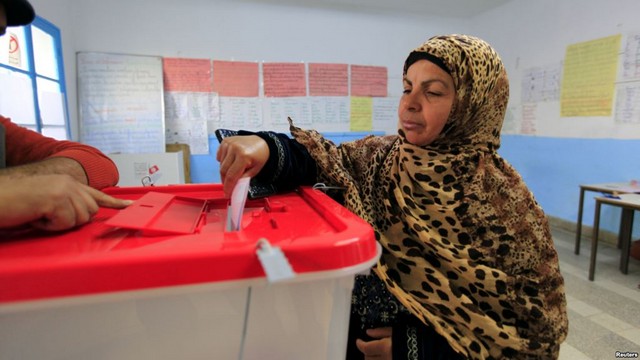By Afro-Middle East Centre (AMEC)
In the past two months, Tunisia organised three successful electoral polls – a parliamentary then a presidential election that was followed by a runoff vote. The results of all three indicate a weakening of the Islamist Ennahda party, and a tolerance for remnants of the Ben Ali regime re-entering politics. The largely peaceful elections and the willingness of defeated candidates to accept the results augurs well for democratic consolidation in Tunisia. However, the country’s authoritarian past, the willingness of its civil society to choose authoritarianism over Islamism, and the re-emergence of Ben Ali remnants suggests the temptation to reverse the gains of the 2011 uprising will remain strong.
Electoral outcomes
The three polls saw the rise of Nidaa Tounes (Call for Tunisia), which won thirty-eight per cent of the parliamentary vote, with its candidate, Beji Caid Essebsi, winning the presidential runoff election with fifty-six per cent of the vote. Nidaa is comprised of a motley of trade unionists, independent politicians, secularists, and former Ben Ali supporters, whose main rallying point has been a disdain for Ennahda’s Islamism. Besides this unifying factor, the party lacks a clear economic programme and has not yet convened its founding congress, because of fears that former Constitutional Democratic Rally members will gain prominence.
Ennahda suffered the most losses in the polls, with its vote share dropping from thirty-seven per cent in 2011 to twenty-eight per cent, and its preferred presidential candidate being defeated by a substantial twelve per cent margin. (Officially, Ennahda did not support any candidate for president, but it is a known secret that most members backed Moncef Marzouki, a secular politician and former president of the Tunisian Human Rights League who was president in the previous Nahda-led governing coalition.) Economic stagnation, increased insecurity caused by a growing extremist Salafi trend, and spillover of the Libyan and Syrian conflicts had made voters question Ennahda’s ability to rule. This was worsened by the party’s lack of grassroots’ institutions – a direct result of it being persecuted and banned under Ben Ali. Tunisia’s new constitution, however, grants a great deal of power to the legislature, which will ensure the Islamic party significant prominence in policy formation.
Coalition Building
Nidaa’s eighty-six seats falls short of the 109 required to form a government, meaning that coalitions will have to be built. Although the country’s myriad challenges can best be tackled through a coalition between Nidaa and Ennahda – with their similar economic platforms and ability to mobilise large sectors of society, and despite Ennahda’s willingness to join a Nidaa coalition, this is unlikely, since Nidaa was formed on an explicitly anti-Islamist platform, and includes many who had striven, under Ben Ali, to eradicate Ennahda. More likely is a coalition between Nidaa and the Popular Front (with fifteen seats) and/or Afek Tounes. The Popular Front’s economic policy is radically different from Nidaa’s, but it has previously worked with Nidaa Tounes. The Free Patriotic Union (with sixteen seats) is also a possible coalition partner, especially as its economic platform is similar to Nidaa’s. However, the friction caused by the presidential campaigns of the leaders of the two parties will first need to be addressed.
Challenges
Clearly, the elections will not erase the country’s structural and systemic challenges, plagued as it is by economic stagnation. Essebsi’s recognition of the disparities in development between different parts of the country is encouraging, but his assertion that instability was caused by the Ennahda-led government and that ‘hard steps’ are needed to reverse this will likely exacerbate the problem and increase polarisation. Recent reports of tensions within Nidaa will also constrain his ability to act, especially if the party splinters and refuses to sanction the soon to be formed cabinet. Many within Nidaa oppose his decision to appoint Habib Essid (a relative independent) to head the cabinet, and his decision to appoint his sons Hafiz Caid Essebsi, Mohamed Ennaseur and Mohamed Imran to the legislature. Perhaps positive is that the Tunisian General Labour Union (UGTT) and other civil society organisations will watch Essebsi’s performance carefully, and will not hesitate to oppose what they regard as bad policies.
16 January 2015

